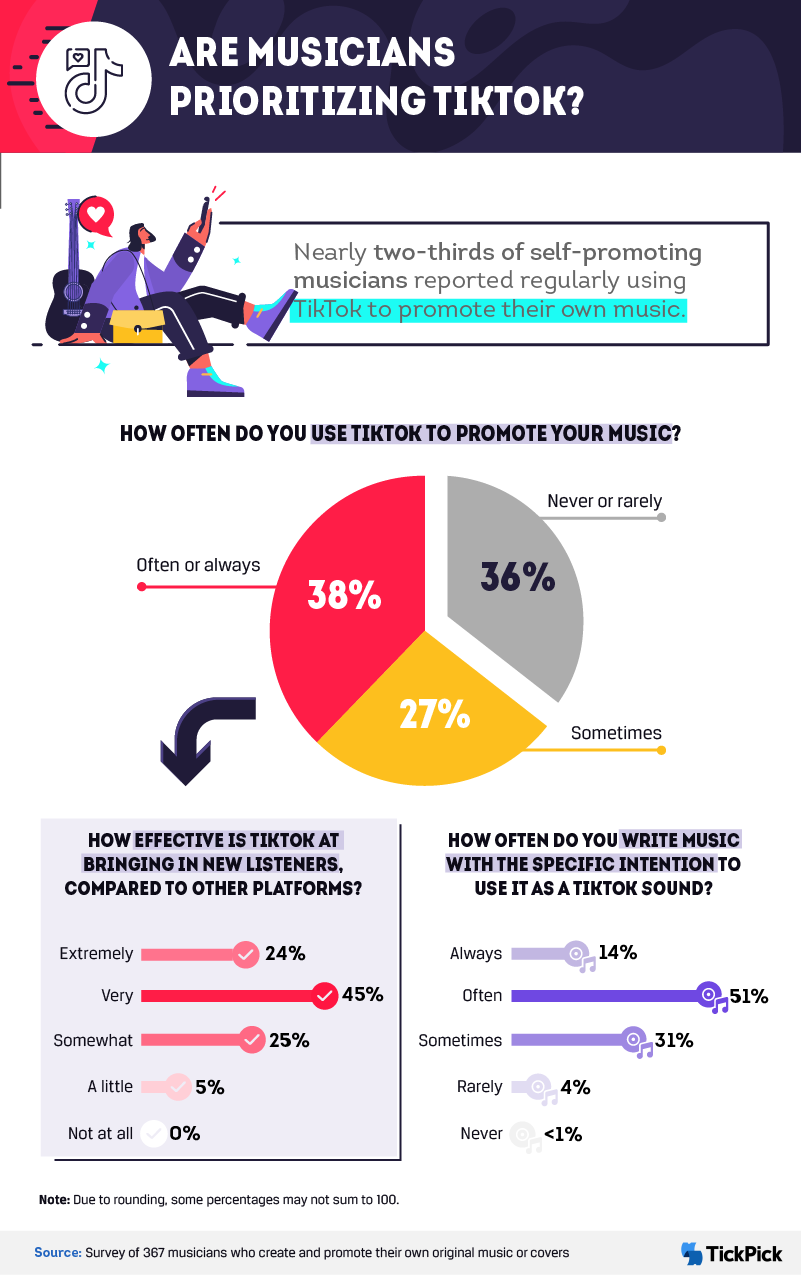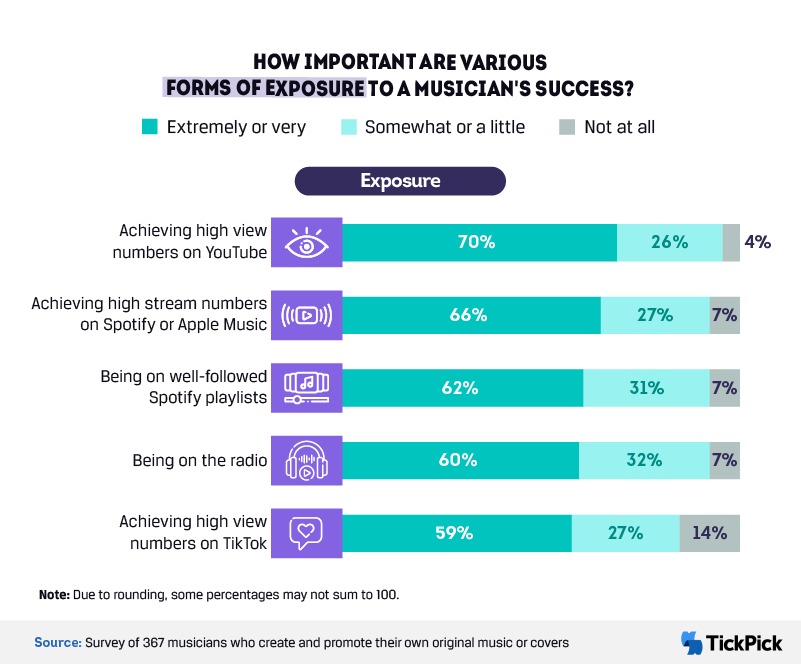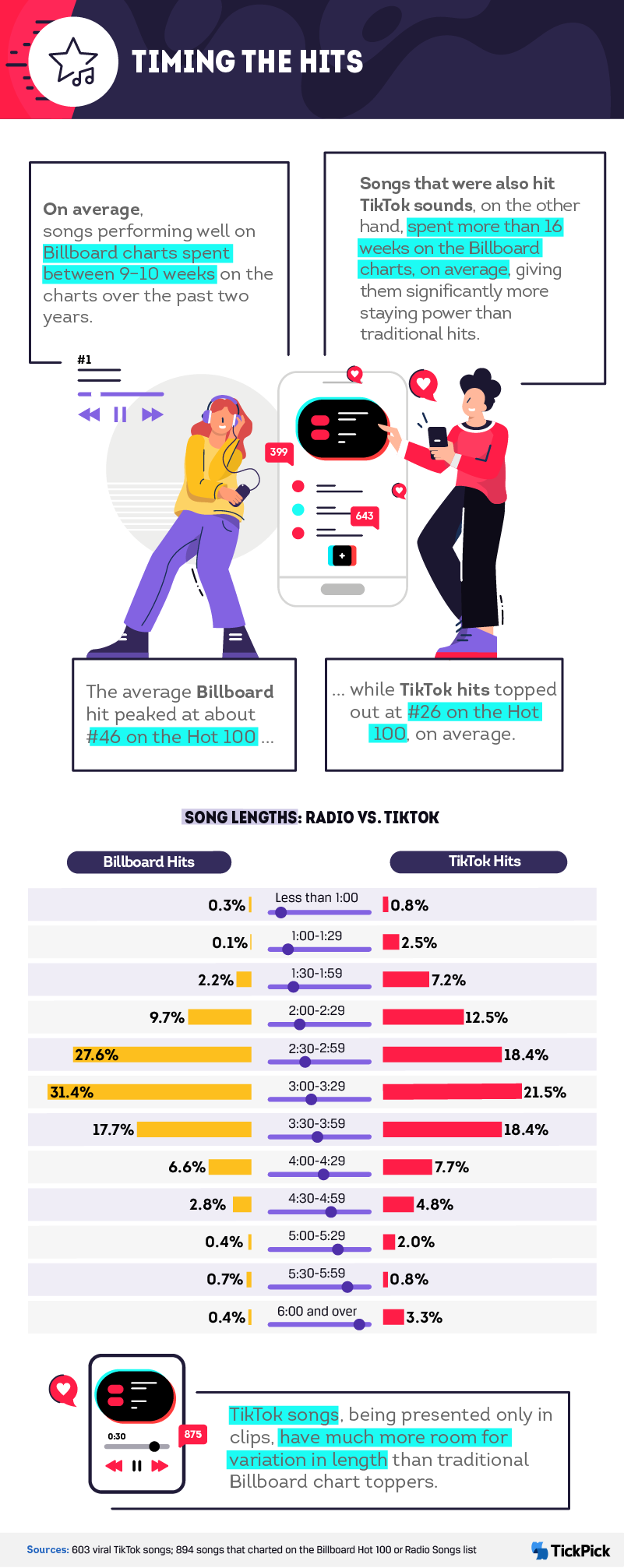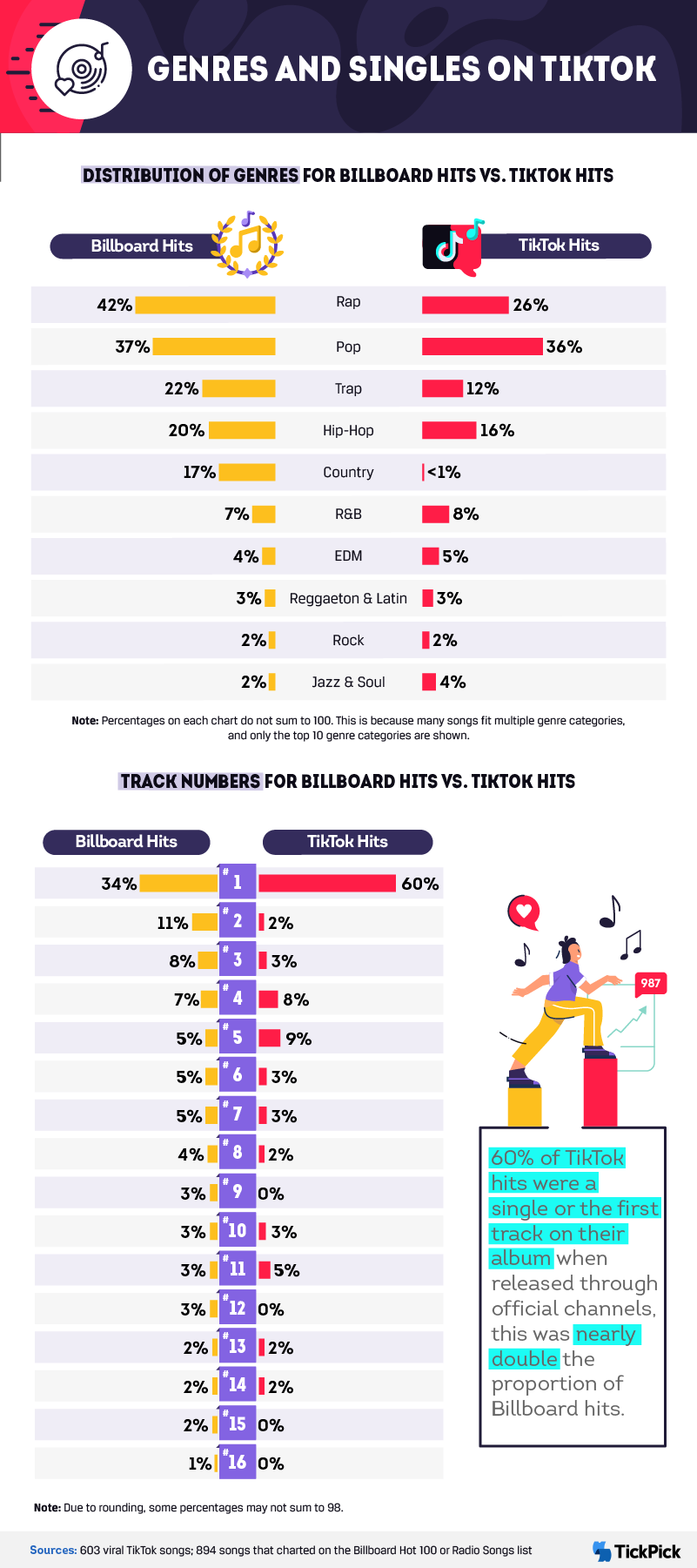Popular music is ever-changing. Record label executives, independent musicians, and marketing managers alike are constantly on the hunt for new methods of generating popularly consumed songs or "hits." Over the past few years, self-promotion has become particularly popular among musicians. Distribution services like TuneCore and DistroKid have significantly increased entry and access into the music market and arguably decreased the need for record deals. Additionally, due in part to the relatively recent advent and popularity of TikTok – a social media platform for making and sharing short videos – promotional pipelines have evolved even further. These recent developments have professionals and fans alike wondering: Has TikTok overtaken traditional avenues of promotion in terms of popularity and demonstrated effectiveness?
We set out to answer this question by using survey data and public data to assess whether and to what extent TikTok is: (1) popular among musicians and within genres, as well as (2) how effective it is as a platform for showcasing and promoting music.
Measures of success in the music industry have been debated by artists and fans alike and are certain to be very personal for artists themselves. Whether modern artists have direct or indirect experiences with TikTok promotion, it definitely isn't a stretch to say that most have something to say about its value.
So then, what do musicians really think about TikTok's effectiveness as a promotional tool? Do they feel it truly provides them an edge more than traditional marketing tactics? Our study gets to the bottom of this central question. By examining and evaluating survey data from 367 musicians who create and promote their own original music or covers, we've come to address a few relevant questions.
For starters, most artists who use TikTok believe it works. More specifically, nearly 70% of those who use TikTok to promote their music said it's very or extremely effective compared to other platforms. Sixty-five percent of these artists also said they "often" or "always" write songs with the intention of using them as TikTok sounds.

An additional insight from the data was that hip-hop artists were the most likely to make regular use of TikTok, with 46% of hip-hop artists having said they use it to promote their music "often" or "always." Hip-hop is also the single most popularly consumed genre in the United States. In other words, almost half of the artists from the most commercially prosperous genre use TikTok in some capacity. While this fact doesn't mean TikTok has completely displaced other industry standard platforms for promoting music, it certainly provides a valuable insight as to how relevant and prioritized TikTok is in the modern music industry, especially among part-time musicians.
Although TikTok has enjoyed widespread use by musicians looking to reach new audiences, it seems that there's a mismatch between the artists' intuitions and their priorities when it comes to choosing a platform on which to promote their music. Artists largely still thought that exposure on more traditional platforms like YouTube, Spotify, and Apple Music was more important for success than TikTok views.
When asked how important various forms of exposure are to success as a musician, YouTube, Spotify or Apple Music, placements on well-followed Spotify playlists, and being on the radio were all perceived as more important than TikTok. Additionally, the proportion of respondents that believe that TikTok exposure isn't important at all is much higher than for the other paltforms. Specifically, 14% of respondents answered "not at all" for TikTok views in the same survey prompt, while the remainder of the categories received 7% or less.

Younger artists were unsurprisingly more likely to believe that achieving high numbers of TikTok views was crucial to success as a musician: 28% of those aged 18 to 25 said it was very or extremely important, compared to 25% of 26- to 30-year-olds and 22% of 31- to 35-year-olds. Much of the opposition to TikTok came from musicians over the age of 30: 18% believed achieving high numbers of views on TikTok was not at all important.
TikTok also underperformed on a more concrete metric: When we asked artists the platforms on which they spend the most effort promoting their music, TikTok ranked lower than other platforms, such as Instagram, YouTube, and streaming services like Spotify and Apple Music. However, TikTok was ranked above some other platforms, such as internet radio, SoundCloud, and Twitter. And these priorities weren't constant across the board: Hip-hop artists once again valued TikTok more highly than their peers in other genres (41% said it was one of their top 3 promotions platforms), and rock musicians valued it the least (26%).
While TikTok may not have surpassed its predecessors yet in the eyes of some musicians, our previous insights bear repeating: Three-quarters of musicians were at least frequently writing music with the intention of using it as a TikTok sound, and roughly 70% believe it's more effective at bringing in new listeners than other platforms. It may just be a matter of time before musicians' priorities catch up to their intuitions.
The word "timeless" is often associated with works of art. In such a rapidly changing and heavily concentrated industry, having fans with dwindling attention spans, maintaining a degree of longevity is bound to be challenging for any artist. This doesn't combine well with the fact that the long-held industry standard metric for a song's success is its time spent on the charts. So, any artist looking to help their music succeed should develop strategies for keeping their songs on charts for as long as possible.
We found that TikTok promotion has made a dramatic impact on the staying power of TikTok-viral songs. Specifically, songs that were also hit TikTok sounds spent an average of more than 16 weeks on the Billboard charts over the past two years. Traditionally promoted hits, on the other hand, had an average staying power of 9 to 10 weeks. It's clear to see, then, that TikTok songs are ultimately on the rise and that the platform produces results.

The way that videos are presented on TikTok also gives the app an edge over traditional methods. TikTok videos created through the app are presented as relatively short clips, with a maximum of 3-minute lengths, while others that are created elsewhere and uploaded can exceed this limit. Our data suggests that, perhaps because of this, TikTok hosts a significantly larger variety of song lengths for TikTok hits as opposed to that of traditionally promoted Billboard hits. Thus, it's fair to say that, in an increasingly saturated industry, listeners have increased access to songs they enjoy and can spend less time on those they don't.
There may be a number of variables that influence the success of a genre of music in a given market or space. With regards to TikTok, though, one thing is certain: TikTok hits are characteristically different from billboard hits. So, when it comes to commercial success, what genres of artists are really benefiting from using TikTok?
The second portion of this study incorporates data collected from 894 songs that charted on the Billboard Hot 100 or Radio Songs list and 603 TikTok viral hits. For the purposes of this study, a ‘Billboard hit' is a song that ranks on Billboard Magazine's Hot 100 Chart, the music industry standard record chart. Rankings are based on sales, radio play, and online streaming in the United States. A TikTok hit, on the other hand, is a song that went viral as a TikTok sound, earning it a spot on the archive of top TikTok sounds found at Tokboard.com.
One look at the data is enough to see that there are some clear characteristic differences between TikTok hits and Billboard hits. The distribution of hits by genre is drastically different, particularly with regard to the top 5 most popular American genres (rap, pop, trap, hip-hop, and country). For example, the proportion of country hits on Billboard is 17%, while the same on TikTok is <1%. Furthermore, 22% of Billboard hits are Trap while only 12% of TikTok hits are the same.

Another interesting characteristic of TikToks stood out in our analysis: Our findings suggest that if you have a TikTok hit, chances are it's the first song on your album. Sixty percent of TikTok hits are a single or the first track on an artist's album when released through official channels, nearly double the proportion of Billboard hits that are the first track. So, if you're a budding artist looking to promote a new single or introductory album track, TikTok may be a great place to start.
Our analysis showed that TikTok can have real impacts on the longevity of hits, dramatically increasing their staying time on industry charts. Artists tend to recognize the potential of TikTok well, but there's a mismatch between their intuitions and priorities: TikTok receives less attention than other major promotional platforms when artists are deciding where to direct their promotional efforts.
If there's anything you should take from this article, it's the following: Nearly two-thirds of self-promoting musicians use TikTok to promote their own music on a regular basis; nearly 70% of this same group said it's very or extremely effective compared to other platforms; TikTok sounds spent an average of more than 16 weeks on the Billboard charts over the past two years, while traditionally promoted songs had a staying power of just 9 to 10 weeks; and lastly, that almost half of the artists from hip hop, the most commercially prosperous genre, use TikTok in some capacity.
While artists are looking for ways to maximize the bang they get per buck spent promoting their music, fans like you might be looking for the most cost-effective way to support your favorite artists. Since its founding in 2011 as the original no-fee ticket marketplace, TickPick has sought to be the most transparent and fan-friendly secondary ticket site out there. Unlike competitors that charge additional service fees at checkout or behind the scenes, TickPick is up front about pricing and saves users money in the process. With features like a BestPrice guarantee, a 100% ticket validity guarantee, a ticket bidding platform, and algorithms built to help fans find the best deal on tickets, buyers are sure to get the best prices at TickPick.com.
Data analyzed for the survey portion of this piece came from 367 musicians, each of whom reported spending at least two hours per week creating, promoting, or otherwise working on their own original music or covers. Twenty percent were between the ages of 18–25, 26% were 26–30, 22% were 31–35, 18% were 36–45, and 14% were 46 and older. Forty percent were women, 60% were men, and one respondent chose to not disclose their gender. For any breakdowns of this sample by the genres of music they create, the sub-sample size ranged from 81 to 128. We included a mixture of musicians who considered themselves serious (33%), semi-serious (28%), and casual (39%).
All respondents passed two attention-check questions and were subject to qualification verification questions intended to remove self-contradictory survey responses. Please note that survey data are limited to the perspective of respondents and are prone to limitations that result from self-reporting. These include exaggeration, survey bias, and telescoping. We did not weight the survey data.
Data analyzed for the latter portion of this piece, concerning songs that were popular on TikTok or appeared on Billboard charts, came from two sources:
After collecting songs that charted on either of these sources between June 2019 and June 2021, we accessed Spotify's API to gather information, such as song length, artist genre, album name, and more. To overcome the difficulty of assigning popular TikTok sounds to their official release title and metadata, we used an AI-driven audio recognition algorithm. Because not all songs in our charts lists were released on Spotify, portions of our analysis are limited only to those tracks which have been released on that streaming platform. For these portions, we limited our analysis to songs available and searchable via Spotify's API, limiting our sample to a healthy 603 songs from Tokboard and 894 songs from the Billboard charts.
A primary difficulty in conducting this analysis was tying particular songs to each other across the different charts. It is challenging to make these connections at scale, and other researchers will likely uncover unique insights by looking closely at the path individual songs take across various platforms' popularity charts.
It's well-established that TikTok's impact on the music industry is worth discussing. So, it's certainly to your advantage to further this conversation. If you find our data useful, feel free to spread the knowledge. Just make sure it's for noncommercial use and you provide a link back to our site when doing so.